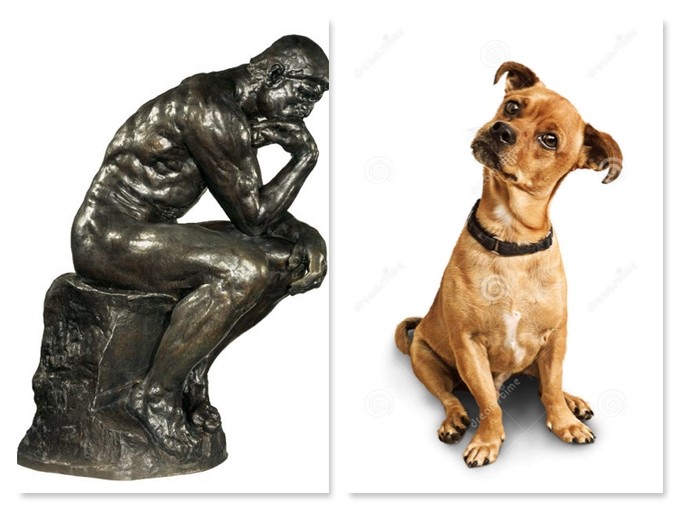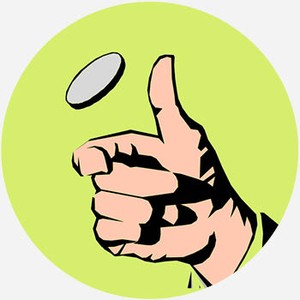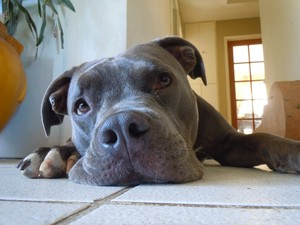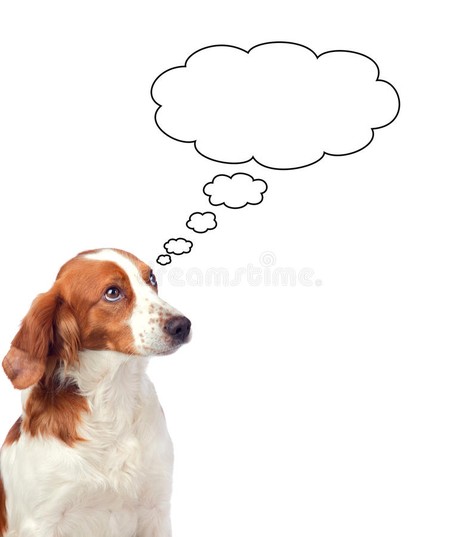Pro-Choice

I recently read about a study that demonstrated how our brains make decisions at least 7 seconds before we are conscious of making them. In the exciting laboratory experiment, the decision in question was to push one of two buttons. Based on brain imaging data, researchers could predict what choice people would make before they themselves were even aware of having made a decision. In other words, we've decided before we know we've decided.
First off, I made a 'note to self'; on my next brain scan, I will ask them to pay particular attention to my frontopolar cortex, the source of the decision making signal. I'm pretty sure mine is damaged. I make most of my decisions — on the advice of a medical doctor, no less — by tossing a coin. The doctor who advised me is one of those Buddhist-based mindfulness types; she often wrote her life-advice out on her prescription pads, imbuing them with medical authority. According to Buddhists, the path is only difficult for those who pick and choose. I've been tossing a coin to make decisions, both big and small, ever since. Doctor's orders.

But what grabbed my interest about the study was the murky area of unconscious/ conscious choice, because anyone who trains their dog sees a similar dynamic all the time. During training sessions, dogs offer behaviours, often at the beginning without any apparent sense of a conscious thought. Then (if positively reinforced) confidence increases, and somewhere along the line the dogs have a cognitive 'aha' moment of knowing and deciding. They make a choice. Of course, if they're like us, the choice was made before they were conscious of it being made. And here my own human bias rears it's head: this dynamic seems more obvious in dogs than it does in us, no doggie brain scans necessary.
And like their human companions, dogs need to feel they can make choices. Urban dogs lead much more managed lives than they did a generation ago. The experts tell us that this is not necessarily a good thing. "The power to control one's own outcomes is essential to behavioural health," states Dr. Susan Friedman, one of the goddesses of the animal behaviour world (a world where, I'm happy to report, there seem to be more goddesses than gods. But then I don't count the Monks of New Skete in my pantheon).
To me 'control' seems a bit of a stretch, so I'm going to stick to talking about choice. One suggestion is to let dogs have more choice in the treat/food department. In a recent experiment, I added microgreens (aka sprouts) to my dogs' diet, placing a substantial whack of them atop their regular food. Pushkin, normally the pickiest, ate hers immediately; Notley shoved them aside, ate her meat patties, then downed the greens; McCracken disdainfully spat them out beside his bowl. I was pleased; they each made a different choice. A subsequent economic choice, made by me, struck the $6 sprouts off the menu.

Microgreens, yay or nay, is probably not what advocates for animal choice have in mind. There is much talk of 'consent', for instance, how to tell whether your dog actually enjoys being patted, or how to make sure s/he consents to grooming (Chirag Patel's 'bucket game' shows how a dog can have veto power over, yet still happily agree to, being groomed).
On-leash outings provide another opportunity for choice. I admit that while I hold the leashes, I am no longer in charge of the route. Pushkin and McCracken now navigate (Notley, the middle child, goes with the flow). They have decided the busier the street, the better: heavily trafficked areas have superior smelling hydro poles.
The only problem comes when Push and Mack Crack orient in opposite directions, each of them staring stonily toward their respective desired destinations. Usually after a lengthy stall, my human authority is reasserted (notice how passively I phrase this). Consolation cookies to the loser are doled out.

Currently much of the dog training world is pro-choice, enthusiastically endorsing more "dog-driven" activities like nose work and parkour. To my eye, the on-line videos for these activities do not really show dogs in the driver's seat — or if they are, there's a lot of backseat driving going on.
I give my dogs some say on the training front, at least in terms of the timing. If I walk into the living room, aka the training ring, cup of coffee and trashy novel in hand, no plans to train, and all three dogs do nice sits, arranged in a semi-circle, tails wagging, I consider myself cued. The book is exchanged for a clicker and treat bag.
Also, in a variety of situations, I don't cue the dogs for specific behaviours. I just pause and look at them expectantly: Make me an offer! The dogs make an educated guess or two, flinging themselves to the ground in a down, or nose nudging me with a touch, whatever. Mostly I reward whatever they offer; sometimes I cue another behaviour, and reward that.

Trainers often cue "do something new" behaviours, but rarely cue "pick a trick, any trick, your choice". It's frowned on in training circles; the dogs might "throw behaviours", running through their entire repertoire ("idiotic", "disturbing", and "free-shaping monster" are all expressions I have come across). There is a sense that this might promote confusion and emotional doggie desperation. I've never seen it; a little high excitement at times, maybe.
Working with dogs can be thought of as a sort of dialogue, a kind of call and response. Obviously, you're gonna want a ton of control over the script if you're training an animal for a show at SeaWorld, or you're competing in some sort of formal dog sport. But with your pet dog, you don't have to be the one to start every conversation, or always have the last word.
There are rare moments when a dog must be saved from the agony of indecision. Sometimes Pushkin hides her chew toy in the bathroom and then sits, wailing, in the hallway. She wants to join us in the living room, but she doesn't want to leave her stash unprotected; moaning in the hallway is her compromise. I remove the chewie. Consolation cookies are again distributed. I mention to the dogs the Buddhist difficulty of picking, choosing, and the path.
Unilateral actions aside, if the dogs decide to make me an offer, I'm usually game. Of course I realize that responsibility and control are ultimately my bailiwick. As the only one with opposable thumbs, I get to toss the coin.
For Further Reading/ Viewing:
7 second delay study: www.nature.com/news/2008/080411/full/news.2008.751.html
Chirag Patel's bucket game:https://www.facebook.com/thebucketgame/
Consent test, or how to tell if your dog likes your magic touch: https://www.youtube.com/watch?v=-cGDYI-s-cQ
An interesting overview on choice and dog training: https://www.whole-dog-journal.com/issues/19_11/features/Training-a-Dog-to-Make-Choices_21546-1.html
When a dog says no: https://www.youtube.com/watch?v=OPQFRs4tLiQ